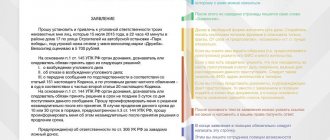The legislative framework provides protection for the safety of property values of Russians from attacks by criminals. When committing a crime, every citizen has the right to file a statement with the police about damage to property; a sample can be taken at the department. Correct execution of the document will facilitate the investigation procedure and allow the culprit to be punished.
Contacting the police.
The legislative framework
A number of property assets are in the personal possession of Russian citizens:
- real estate;
- personal vehicles (cars, motorcycles, mopeds, scooters, etc.);
- antiques, paintings by famous artists and other interior items.
Intentional or unintentional violation of their integrity is defined by law as damage. It can have 2 degrees:
- Partial. It manifests itself as incomplete damage to property with the possibility of restoration through repair or restoration.
- Full. Expressed by final destruction or destruction.
Federal laws.
Intentional damage to property belonging to individuals is regulated by Article 167 of the Criminal Code of the Russian Federation. The legislative act specifies the sanctions imposed on the offender when his guilt is confirmed in court.
Responsibility and penalties for unintentional damage to personal property of citizens are discussed in Art. 168 of the Criminal Code of the Russian Federation.
To open a criminal case regarding the crime in question, it will be necessary to estimate in monetary terms the amount of harm caused. Procedural proceedings begin in the following cases:
- the cost of property damaged as a result of the deliberate actions of the offender is at least 2,500 rubles;
- damage caused unintentionally is estimated at an amount exceeding 250 thousand rubles.
Types of liability
If a person legally owns property assets, he or she can seek redressal of any irregularities associated with such ownership. In case of intentional damage to someone else's property, the following types of liability may arise:
- civil liability - by filing a claim in court for damages;
- criminal liability - by filing an application with law enforcement agencies about damage to property assets and initiating a case on this fact.
In addition, this provision of the law also contains a description of the special methods that the offender used to cause damage to property:
- hooligan urges;
- socially dangerous actions in the form of deliberate arson, explosion, etc.;
- actions that simultaneously led to the death of citizens or other grave consequences.
If the actions of the guilty person cause significant damage to property assets, the owner may demand simultaneous prosecution of both types of liability. However, only in criminal proceedings will state law enforcement agencies protect the owner.
Punishments for intentional and accidental (due to negligence) damage to property are determined by the Criminal Code of the Russian Federation. According to the Criminal Code of the Russian Federation, “damage to property” means both partial and total (complete) destruction of property.
Partial damage is the degree of damage to property that can be eliminated, repaired, or eliminated.
Complete damage is the degree of damage to property that cannot be eliminated during repair or restoration.
Thus, liability for intentional damage to property is determined by Article 167 of the Criminal Code of the Russian Federation.
Liability for damage to property due to negligence is regulated by Article 168 of the Criminal Code of the Russian Federation.
In order to be held accountable for damage to property on the basis of Articles 167 or 168 of the Criminal Code of the Russian Federation, the application must indicate the cost of the damage caused, equal to:
- Two thousand five hundred rubles for intentional damage to property;
- An amount exceeding two hundred and fifty thousand rubles for damage to property due to negligence;
What is meant by property damage?
In Russian legislation, property damage means causing damage to someone else's property. Based on the nature of the offender’s actions, damage is divided into intentional and unintentional, and based on the amount of financial losses - into causing minor and major losses.
Damage to property.
Intentional damage
Criminal intent consists of deliberately causing harm, destruction or destruction of property belonging to individuals. If an attacker does not realize the illegality of his actions and the likelihood of damaging someone else’s property, Article 167 of the Criminal Code does not apply to him.
The legislation of the Russian Federation provides for the punishment awaiting an offender who intentionally causes damage to the personal property of citizens:
- fine up to 40 thousand rubles. or withholding three months' earnings in favor of the state budget;
- unpaid correctional labor;
- administrative arrest or imprisonment for up to 24 months.
If criminal actions related to damage to property led to the death of a person or other serious consequences, the perpetrator is convicted under clause 2 of Art. 167 of the Criminal Code of the Russian Federation and sentenced to 5 years in prison. A similar amount of punishment awaits attackers who cause damage to someone else’s property for hooligan reasons. The same sanctions are imposed when a crime is committed in a socially dangerous manner.
Damage to someone else's property.
Unintentional damage
Damage to property due to negligence in the Criminal Code of the Russian Federation is regulated by Article 168. Unintentional damage occurs as a result of a fire, explosion, car accident and other situations not related to purposeful actions. An offender found guilty by a court under this article will face the following sanctions:
- Fine to the state budget. The amount is determined based on the results of the procedural proceedings. The maximum amount is the annual salary of the defendant or 120 thousand rubles.
- Unpaid work - forced labor for up to 12 months or correctional work for up to 2 years. In some cases, the judge imposes a sentence of 480 hours of compulsory voluntary work.
- Imprisonment or restriction of freedom for a period of up to 12 months. Such sanctions await the offender who, through careless actions, has caused damage on an especially large scale.
Other penalties
For intentional and unintentional damage to property, not only criminal, but also administrative liability can be imposed.
Thus, according to Article 7.17 of the Code of Administrative Offenses, for intentionally causing harm to someone else’s property, the guilty person may be brought to administrative liability, which is expressed in the payment of a fine in the amount of three hundred to five hundred rubles.
However, such a minor administrative fine can be imposed only if the cost of damage caused to property is no more than two and a half thousand rubles.
Info
A police officer is responsible for issuing administrative fines. Persons over the age of sixteen can be held administratively liable.
How to assess damage
To make a decision on the case under consideration, the injured party will need to provide human rights authorities with information about the price of the destroyed property or the cost of restoration work. In situations with arson, flooding of apartments, and intentional damage to cars, it is recommended to use the services of experts. After the survey, appraisers clarify the amount of losses.
Estimation of the amount of damage.
If the damage is minor and paying for an expensive examination is not practical, the victim can himself assess the extent of damage to personal property. To do this, you will need to find similar items for sale and find out their market price or present copies of receipts and certificates of acceptance of restoration work.
Appealing a court decision
The court's decision on the need to compensate for the material damage caused can be appealed. To do this, the accused party must file a petition with the court to review the court's decision. This is a rather complex process that requires a lot of time and the collection of the required amount of reasoned evidence that you are right. For example, the court ordered compensation for the cost of expensive repairs to a car that were necessary to restore it after deliberate damage. If the defendant provides evidence that the amount requested by the injured party is significantly more than the actual cost, then the established compensation payments may be canceled.
How to write a police report correctly
The police are the first authority to receive information about criminal activities. There are 2 ways to report an offense:
- Oral. The victim goes to the nearest police station and explains to the officer on duty the circumstances of the incident. The employee records the testimony in the protocol.
- Writing. The citizen writes a statement according to established standards. A sample must be provided at the department.
Sample crime report.
Document structure and sample
The structure of the application includes the following sections:
- In the upper corner on the right are the details of the authority of appeal (number and address of the police station, rank, surname and initials of the chief), below - the applicant’s data (full name, place of residence and registration, telephone number for contact).
- Document's name. In the center of the page, in capital letters, write “Statement of property damage.” There is an indent of one line between the name and the header.
- Description. In the most voluminous part, the circumstances of the incident are stated in business language.
- Requirements. Referring to legislative acts, they express a request to take appropriate measures to criminally or administratively punish the offender.
- Conclusion. Contains the date of filing the application and the signature of the victim.
The document is accompanied by the results of an examination to assess the cost of damaged property, estimates for restoration work or checks for payment for repairs.
Deadlines for submission and review
Since the statute of limitations for cases involving damage to someone else’s property is limited to 3 months, it is recommended to report to the police immediately if damage is detected.
Application processing time.
Such applications are considered by human rights officials without delay. If the accusations are justified, operational measures are taken to investigate the offense.
The police are given time to verify the information received. The minimum period for analyzing information is 3 days. If additional research and examination is required, the period is extended to 30 days.
Unintentional actions
If property damage occurred as a result of the negative impact of another source of a dangerous factor, for example an explosive, then such circumstances will relate to unintentional damage to the property of other citizens. In this case, the punishment will be imposed under Article No. 168 of the Criminal Code:
- imposition of a fine in an amount not exceeding 120,000 rubles;
- seizure of an amount equal to the income of the accused for 1 year;
- within 20 days performing forced labor;
- corrective labor activity for two years;
- sanctions in the form of arrest or detention for the same period of up to two years.
Where to contact
Depending on the tasks that the victim sets when contacting law enforcement agencies, the application is sent to one of the following authorities:
- the police bringing criminals to administrative or criminal liability;
- the prosecutor's office, which receives complaints about the inaction of police officers if they refuse to respond to an appeal;
- judicial authorities considering claims for compensation for damage.
To the local police officer
The appeal is made by drawing up an application using a sample similar to the document submitted to the police. In the header, instead of information about the head of the department, the data of the district inspector is indicated, including rank, position, surname and initials.
Contact the local police officer.
The narrative includes the place, time and detailed circumstances of the crime. The style of presentation is informational, without emotional overtones or expression of hostility towards the culprit.
It is advisable to write reliable information about the alleged attacker, for example, full name or address.
To the prosecutor's office
Citizens who have been refused by police to investigate a crime involving property damage can send a complaint to the prosecutor. There is no established form for filing such an appeal; it is recommended to adhere to the uniform standards accepted by legal practice.
Contact the prosecutor's office.
The prosecutor's service has 7 days to consider the application. If additional verification is necessary, the deadlines are extended to 30 days.
To court
If the victim wants to compensate for financial losses and moral damages, a lawsuit is filed. The registration rules are specified in Art. 131 Code of Civil Procedure of the Russian Federation. Documents drawn up in violation of established standards are returned to the plaintiff for revision.
In what cases should I go to court?
Having discovered the fact of property damage, the victim contacts the relevant law enforcement agencies. The actions of violators of the law are subject to criminal or administrative liability depending on the severity of the crime and the amount of damage.
This article talks about typical ways to resolve the issue, but each case is unique. If you want to find out how to solve your particular problem, call:
- Moscow .
- Saint Petersburg .
Or on the website. It's fast and free!
The victim contacts the authorities in the following cases:
- There was destruction or damage to property on a large scale, the act was committed intentionally (Article 167 of the Criminal Code of the Russian Federation). According to the article, a penalty of 40,000 rubles is provided. up to 5 years of imprisonment.
- Destruction or damage to property that occurred unintentionally is provided for in Art. 168 of the Criminal Code of the Russian Federation. If the law is violated by a minor, responsibility shifts to guardians or parents.
- Damage to property on a small scale is punishable by administrative sanctions.
Based on his testimony, a protocol will be drawn up, evidence will be collected and the case will be brought to court. If for any reason the victim is refused to accept a statement from the police, he should contact the prosecutor's office.
A written statement to the police or prosecutor's office is made as follows:
- the standard header includes the name of the law enforcement agency, information about its head (full name, position, rank), personal data of the victim;
- a description of the facts of the case and information about the violators of the law (they can be accurate or speculative);
- requirement to bring the alleged culprit to justice;
- date and signature of the applicant.
To recover damages, a claim for damage to property is filed in court. It can be sent by mail or brought in person to the courthouse.
Costs for the services of an appraiser are usually included in the compensation presented to the defendant. The statement of claim is drawn up in accordance with the provisions of Art. 131, 132 Code of Civil Procedure of the Russian Federation. In addition, the following documents must be attached to it:
- copies of the application in the amount of all persons (defendant, third parties) involved in the case;
- a document confirming payment of the state duty;
- a power of attorney confirming the rights and powers of the person representing the victim;
- documents containing the facts of the incident on the basis of which the plaintiff demands compensation for damage (copies of these documents are required for the defendant and third parties);
- the text of the regulatory legal act in case of a challenge and the facts confirming the pre-trial settlement of the dispute, if this is provided for by law or contract;
- assessment of the amount of the penalty (an assessment examination is carried out in advance), which must be signed by the applicant and his representative (the required number of copies is required).
To file a claim for property damage properly and avoid mistakes, it is better to take legal help.
Statement to the police
At what age are they held accountable?
Punishment for causing damage to someone else's property awaits any citizen of Russia who has reached the age of 16. According to current legislation, teenagers over the age of 14 who commit a crime under aggravating circumstances are brought to criminal responsibility. Such cases include damage to property associated with harm to human health or life.
Age for prosecution.
Deliberate actions
If a person has a direct desire to damage or spoil property belonging to another citizen, then such actions will be considered intentional damage to property values. If a citizen did not realize that the result of his action would be damage to property, then punishment under Article 167 will not follow. When the act of an attacker falls under the above article, the following penalties may be imposed:
- Penalties of no more than 40,000 rubles or withholding the amount of income officially received by the accused for the last 3 months of work;
- Involvement in forced labor activities;
- Placement under arrest or correctional institution for up to two years.
When it comes to court
Upon completion of operational activities, the police establish the offense and identify the person responsible. In this case, procedural proceedings are initiated. The victim will need to file a statement of claim.
The instance of appeal depends on the amount of damage: if the amount of losses does not exceed 50 thousand rubles, the claim is submitted to the magistrate’s court; in case of a larger amount of damage, the case is considered by district and city departments.
Consideration of the application in court.
Claim to a judicial authority
The next way in which you can protect your rights and legitimate interests violated by damage to property is to file a claim in court. Article 131 of the Code of Civil Procedure imposes certain requirements on a claim.
Attention! If they are not met, the court will leave the claim without progress, and the plaintiff will be given time to bring the claim to the requirements set out in this article, namely:
- the name of the court to which the claim is filed, indicating the name of the locality, the name of the street and the number of the building where the judicial body is located;
- last name, first name, patronymic of the plaintiff, address of his place of residence, means of contacting him in the form of a telephone number, email address;
- surname, name, patronymic of the defendant, address of his place of residence;
- price of claims;
- the title of the document is “Statement of Claim for Recovery of Damage Caused and Compensation for Moral Damage”;
- circumstances of damage resulting from damage or destruction of property;
- how the amount of material damage and moral damage is determined;
- whether measures were taken to resolve the dispute pre-trial, how the defendant responded to this;
- legal grounds for going to court;
- the essence of the claims;
- list of attached materials;
- date, month, year of filing the claim, signature, surname, initials of the applicant.
In addition, to achieve better results, it is recommended to use the following recommendations:
- The events that occurred must be presented in chronological order. This will allow us to most fully and accurately reflect the course of real events;
- the factual circumstances of the case should be presented succinctly and completely. If there is a lack of agreement that may arise after reading the claim, a suspicion may arise that the plaintiff is hiding something;
- the text of the document must be presented in paragraphs with a complete thought;
- You cannot jump from one event to another.
Claims of a material nature are subject to state duty. However, if a claim is filed for compensation for property damage and moral harm caused by a crime, then in accordance with paragraph 4 of part 1 of Article 333.36 of the Tax Code, the state duty is not paid.
If the value of the claims does not exceed 50 thousand rubles, the case will be considered by the magistrate court. If the amount of claims exceeds the specified amount, the case is subject to consideration by a district or city court.
It should be borne in mind that an acquittal in a case does not deprive the victim of the right to file a claim for compensation for damage caused. In this case, one should be guided by Article 1064 of the Civil Code. However, in this case, the claim will be subject to a state fee, the amount of which depends on the amount of the claim.
To make a decision on the merits of the stated claim, the law allocates one month for the magistrate court, and two months for the district court.
What to do in case of acquittal
An acquittal is rendered in the following cases:
- the victim’s property was partially damaged or destroyed as a result of military operations related to hostilities or natural disasters;
- the non-involvement of the accused in the incident was confirmed.
In such situations, the court has the authority to refuse to satisfy a civil claim for damages.
Criminal liability is removed in the absence of evidence of involvement in criminal acts (in this case, the law on the presumption of innocence comes into force).
Some nuances of filling
Events must be presented clearly and in order so that the description reflects the actual course of events. The facts of the case must be succinct, complete and justified. According to the chronology of events, the text is divided into paragraphs. The application must clearly indicate which right of the bearer was violated, and which article of legislation provides for the protection of this right (link to a specific article or legal act).
A claim for compensation for damages resulting from damage or destruction of property has time limits. The statute of limitations is three years from the date the incident occurred. It is impossible to be sure that the court will rule in favor of the plaintiff. It is based on the extent to which the defendant’s responsibility for the crime has been proven.
Arbitrage practice
As an analysis of judicial practice shows, the norm in question can result in either real imprisonment for a citizen or a more lenient punishment, and in rare cases even an acquittal: the outcome of the case depends on the circumstances of the crime and the literacy of the defense attorney.
The significance of damage in this case is an evaluative concept. The Criminal Code sets a limit, if exceeded, it can be considered as such - this is an amount of 5,000 rubles or more. In this case, the court must take into account the totality of all income of the victim (salary, pension, benefits) without exception. The income of the husband (wife) is also added here if joint property (for example, a car) is damaged.
It often happens that the injured person can claim that damage of 5-6 thousand rubles is significant for him, while having an income of 40-60 thousand rubles or more. As a result, a person who has made a mistake, and often has already repented of it, ends up in the dock. Competent lawyers analyze the completeness of the data collected by the inquiry officer or investigator about the victim’s income, as a result of which there is a chance of ending the case with an acquittal.
Convictions under Part 1 of Art. 167 of the Criminal Code of the Russian Federation are issued only if it is obvious that significant damage has been caused to the victim.
If a person has an outstanding criminal record at the time of committing the offense, this may result in him being sentenced to real imprisonment, even if he is compensated in full.
Statement of threats: rules for drafting in 2019
A properly drafted threat statement should include the following information:
- The name of the territorial body of the Ministry of Internal Affairs to which the victim applies (for example: Department of the Ministry of Internal Affairs of Russia for the Basmanny District of Moscow);
- Last name, first name and patronymic of the victim;
- Residence address;
- Contact phone number or email address;
- Description of the situation that arose (the applicant must indicate who threatened him, how exactly, where and under what circumstances);
- List of witnesses (if threats were made in front of witnesses, we recommend listing their full names and contact information known to you);
- List of attached evidence (for example, printed screenshots or a flash drive with recordings of phone calls);
- Please consider the application and initiate a criminal case;
- Date of application (in DD/MM/YYYY format).
threat statements (2021 version)
Example of a police report about death threats
To the Head of the Police Department for the Kitai-Gorod district
Durov Vladimir Alexandrovich
from Bernard Juno Augustovna
address: 119618, Moscow,
Varvarinskaya st., 9, apt. 15
telephone
Statement
about a threat to life
On the night of April 3-4, 2021, my ex-husband, Daniil Mstislavovich Golitsyn, threatened to kill me.
The threat was made to them under the following circumstances: late at night he came to my house drunk and with an ax in his hand. He knocked and rang the doorbell. When I didn’t open the door and said I would call the police, my ex-husband began threatening to kill me. He shouted that he would kill me and my newborn child, and hit the door with an ax.
My neighbors can confirm that he threatened to kill me:
- Shmidt Georgy Edgarovich (address: Moscow, Varvarinskaya st., 9, apt. 13, telephone)
- Schmidt Nadezhda Stefanovna (address: Moscow, Varvarinskaya st., 9, apt. 13, telephone)
- Tsvetkova Yana Leonidovna (address: Moscow, Varvarinskaya st., 9, apt. 11, telephone)
I believe that these threats are justified, since during our marriage Golitsyn D.M. He repeatedly beat me while under the influence of alcohol and drugs, and threatened to cut off my hands and kill me.
I ask you to consider the application and initiate action against Golitsyn D.M. criminal case.
"04" April 2021
Signature: _______________ /full name/
threat statements (2021 version)
Note! If you have questions or encounter any difficulties when preparing an application to law enforcement agencies, you can always seek free legal advice from the specialists of the CenterSoveta portal. The average waiting time for a response from a lawyer is 15 minutes.








